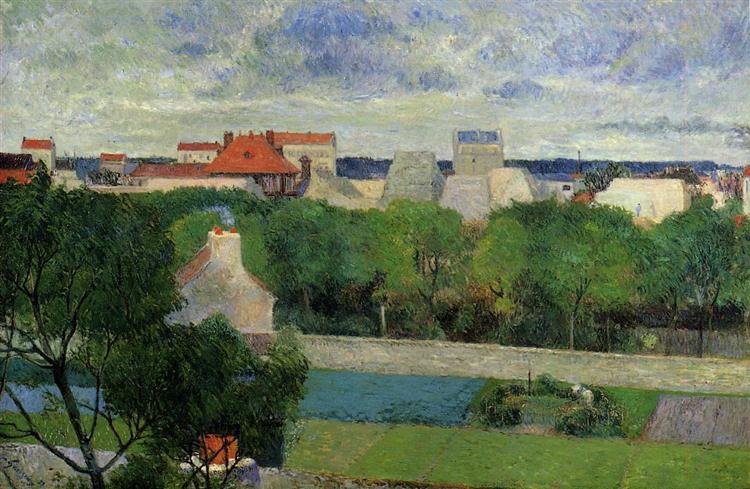Tanım
Paul Gauguin's "The Orchards at Vaugirard", painted in 1879, reveals a fascinating engagement with the depiction of rural life in the vicinity of Paris, a theme that resonates in the imagination of the time and in the evolution of the artist himself. In this painting, Gauguin captures the essence of the agricultural landscape with a vibrant colour palette and a focus on composition that invites meditation on the relationship between man and nature.
The painting shows a cultivated field, interspersed with paths evoking agricultural work. The use of colour in this work is notable; green and brown tones predominate, symbolising the fertility of the land, while shadows are subtly used to add depth to the scene. Light plays a fundamental role, illuminating some elements of the landscape and lending an air of freshness to the composition. This luminosity highlights the vibrant plant life and suggests the tacit presence of human beings in the environment.
In the background of Les Orchards de Vaugirard, the houses and chimneys of an industrial Paris on the rise can be seen, contrasting with the serenity of the rural landscape. This juxtaposition provokes a reflection on the tensions between modernity and the pastoral, a recurring theme in late 19th-century art. Gauguin, in capturing the simplicity and beauty of the garden, also makes a comment on the imminent transformation of natural spaces in favour of urban development.
As for the human figure, in the painting we can see some silhouettes that blend in with the surroundings, probably representing farmers in the midst of their daily activities. These figures are blurred, almost abstract, which allows the viewer to focus on the landscape itself, a testimony to the environment in which they live. This technique of delicate inclusion of the human figure is characteristic of Gauguin, who, during his career, developed an interest in humanity in a more symbolic and less narrative sense.
Gauguin's style in this work is often associated with the Impressionist movement, although his lateral explorations of the symbolic and his bold use of colour take him in a new direction. The influence of other contemporary artists is evident, such as the luminous approach of Claude Monet, but the interpretation of reality through Gauguin's personal lens is what gives his work a distinctive authenticity.
In the context of Gauguin's artistic development, "The Orchards of Vaugirard" can be seen as a precursor to his future explorations into symbolism and the use of colour in more introspective and complex works. Through this painting, the artist not only documents a landscape, but also inscribes a moment of connection between man and his environment, a bond that, though simple, becomes a central theme of his later work.
The significance of this piece goes beyond its depiction of the landscape; it is an echo of a time when social and technological change began to reshape the fabric of everyday life, a reminder of the beauty to be found in the simplicity and tranquility of rurality before its disappearance in the face of the inexorable march of modernity. "The Orchards of Vaugirard" is, ultimately, a testament to the light and life flowing through the land, captured with Gauguin's signature mastery.
KUADROS ©, a famous painting on your wall.
Hand-made oil painting reproductions, with the quality of professional artists and the distinctive seal of KUADROS ©.
Painting reproduction service with satisfaction guarantee. If you are not completely satisfied with the replica of your painting, we will refund 100% of your money.

